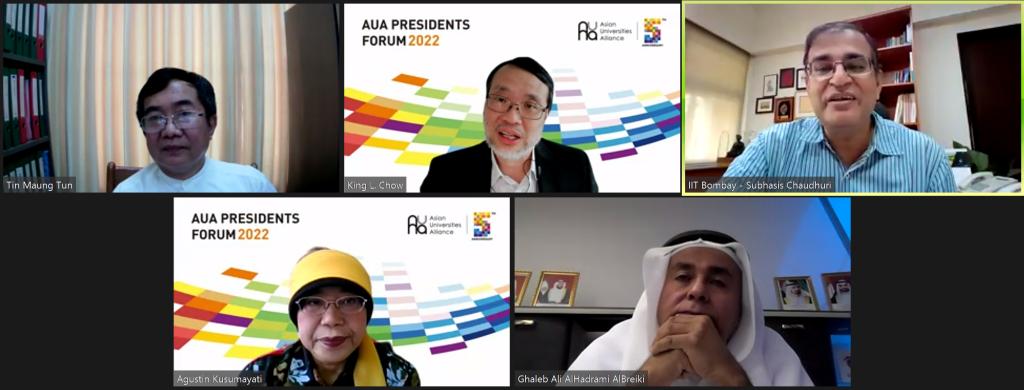On 25 March 2022, AUA members convened for the fourth session of the Asian Universities Alliance Presidents Forum (AUAPF) 2022. With the theme of "The Networked University for an Integrated Education and Research Ecosystem", the session brought together Prof. Ghaleb Al Hadrami Albreiki, Acting Vice-Chancellor of the United Arab Emirates University; Prof. Subhasis Chaudhuri, Director of the Indian Institute of Technology Bombay; Dr. Agustin Kusumayati, University Secretary of Universitas Indonesia; and Prof. Tin Maung Tun, Rector of the University of Yangon. Prof. King Chow, Acting Dean of Students of The Hong Kong University of Science and Technology, moderated the session.

Panelists openly shared their initiatives and experiences in creating an environment for integrated education and research through the optimization of institutional resources and by strengthening connections between academic units. According to Prof. Albreiki, the United Arab Emirates University (UAEU) is now driving interdisciplinary education by dismantling its traditional academic units. Their colleges are going through a process of restructuring, where new interdisciplinary programs are under discussion and planning. With some undergraduate programs suspended due to relatively low enrolment, the UAEU will focus more on graduate programs that can contribute to the national economy and knowledge creation.
Students of the Indian Institute of Technology Bombay (IITB) are encouraged to expand their learning beyond classrooms. Prof. Chaudhuri believed that this is especially important for undergraduate education, “because graduate education automatically involves research and knowledge development.” The undergraduate student body are provided with various research opportunities from the second year onwards, including 24/7 access to makeup spaces and labs and additional credits for research work.
Dr. Kusumayati believed that interdisciplinary collaboration is the only way to solve interconnected problems and improve resilience against crises as large as the COVID-19 pandemic. Under the national education program “Emancipated Learning”, Universitas Indonesia now encourages students to learn outside their programs for a maximum of three semesters, either from UI, other universities, or the industry. “When they [students] are doing an independent project or developing a new business, they have to work together with colleagues from other disciplines and learn from them,” said Dr. Kusumayati.
Prof. Tin Maung Tun agreed that interdisciplinary research is essential to finding solutions to new problems and grand challenges. This means that the university curriculum will have to change in order to meet such demands. He also stressed the importance of creating an institutional culture that encourages innovation and collaboration.
Panelists also elaborated on the importance of building trusting, reciprocal, and enduring relationships with other universities and organizations. As many universities are facing budget cuts, Prof. Albreiki suggested that universities could form a network that allows students to fulfil part of their program requirements by taking courses from other universities as a way to deal with the financial challenge. According to Dr. Kusumayati, the program of “Emancipated Learning” has greatly encouraged Indonesian universities to seek collaboration with many kinds of stakeholders. “We want to send our students into the field, industry, and research institutions,” she said. By providing knowledge and technology to these partners, a university can gain additional support for its education and research. Prof. Chaudhuri also supported the university-industry partnership, emphasizing that higher education institutions in developing countries like India have the responsibility to support their industry with their learning.
While the universities gain support and benefits from such a network, they are also giving back and sharing what others need. For example, IITB works with the local governments to solve water and power problems in rural areas. It has also joined the National Programme on Technology Enhanced Learning to provide free quality education to anyone interested in learning from the IITs. “We will have to see that what we do makes an impact on the life of the common people on the street,” commented Prof. Chaudhuri. In a similar spirit, Universitas Indonesia assists younger and/or smaller universities in terms of their curriculum development and university management. Dr. Kusumayati added that the university is also expanding its courses to students from other universities under the “Emancipated Learning” program.
Additionally, this session also addressed resource allocation for the arts and social sciences, the balance between long-term educational goals and short-term difficulties and concerns, and ways to minimize the digital divide during the pandemic.
During his summary, Prof. Chow emphasized that building an integrated education and research ecosystem is important not only for an institution itself, but also for the whole community. He hoped that AUA will lead the joint effort to “raise the entire Asian education community to a different level.”
This is the fourth session of AUAPF 2022, which had the theme “Embracing Asian Diversity for a Shared Future: Mission of Universities in Fostering a Community of Life for People and Nature”. The previous three sessions explored the themes of university internationalization, innovation and lifelong learning, and interdisciplinary education. The upcoming plenary session, which features the fifth anniversary of the founding of AUA, will be held on 22 April.
Writers: Lam Ka Tat, Camilla Kong